Last witnesses of the Holocaust
- Published
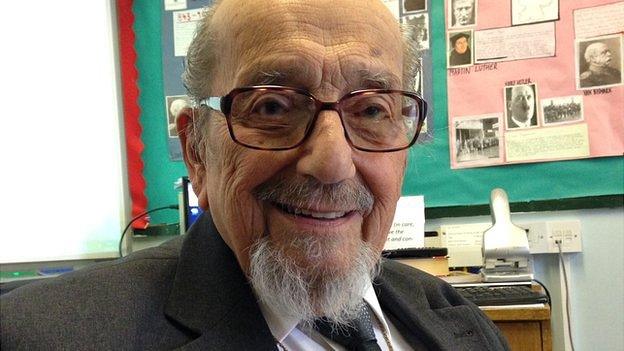
Harry Bibring escaped Nazi persecution in Vienna in the 1930s to come to England
For more than 20 years, Harry Bibring has been telling his story to thousands of pupils. He's been a living witness.
He's talked about what he saw as a Jewish child in the 1930s when the Nazis took over his home city of Vienna in Austria. He last saw his parents in March 1939 when he caught a train, part of the Kindertransport, which brought Harry and his sister to England.
Such survivors of the Nazis have visited many schools, sharing their memories, passing their first-hand stories from one generation to the next.
But there is no escaping the passing of time and the remaining survivors are now getting frail. This is the 70th anniversary of the end of the Holocaust and there won't be many more big anniversaries when teenagers will be able to hear from people who saw these events with their own eyes.
These are the last witnesses and their stories will slip from living testimonies to recorded history.
On a January morning in Hampstead School in north London, Harry Bibring talks to a group of sixth-form history students. On the wall behind him is a poster about German history and a cut-out picture of Hitler.
Forced out of school
Mr Bibring, who will be 90 this year, was forced out of his own school by the coming to power of the Nazis. He remembers seeing the burning of Vienna's synagogues and the smashing up of his father's shop, in the wave of anti-Semitic attacks in 1938, known as Kristallnacht.
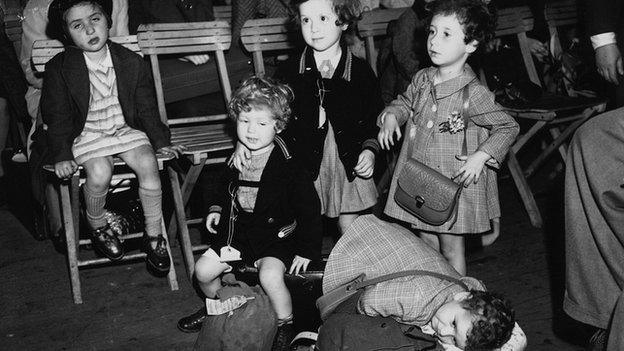
Jewish refugees from Vienna arriving in Liverpool Street Station in London in 1939
"I remember seeing the Jews being forced to scrub the pavement. I saw that with my own eyes.
"It was the day after Kristallnacht. I came to this crowd of people. They were on the floor being kicked, their hair being pulled, their beards being pulled.
"That was the point when my parents stopped trying to make it sound like it wasn't serious. It was the first time my mother said to me, 'I don't know any more, it's getting out of hand.'"
Along with other Jewish pupils, he was forced to leave his school.
"Teachers didn't want anything to do with me, they treated me like vermin. They wouldn't speak to me or answer questions, because they were scared. They didn't want to get a reputation that they were teaching Jews, that was dangerous, bad for their career."
He says that his "non-Jewish friends dropped me on day one. They didn't want anything more to do with me. They just disappeared."
In contrast, he says his sister's friends stayed in touch and smuggled her into cinemas from which Jewish people had been banned.
'I shall never understand'
More than 75 years later, it is the behaviour of his teachers that still appals him. And as evidence he produces a handwritten school report from the academic year 1937-38.
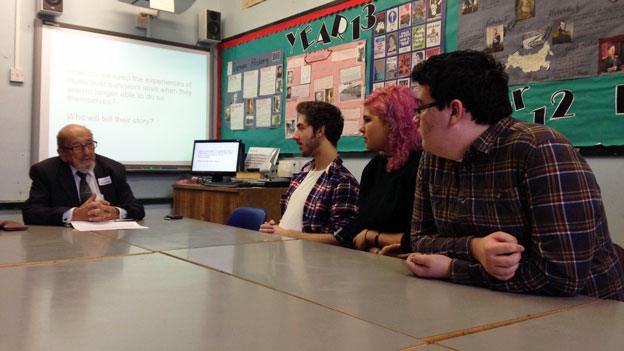
Harry Bibring with students at Hampstead School
Mr Bibring was invited to give talks in Austria 10 years ago and went back to his old school. He describes it as one of the most moving days of his life.
The staff were able to give him his report, detailing his progress in lessons and then in an equally neat hand, it records that because he was a Jew he had had to leave.
"Now picture this, a bottle of ink, a pen and the teacher writes this, and he writes it in my class 12 times. I can't understand someone doing this.
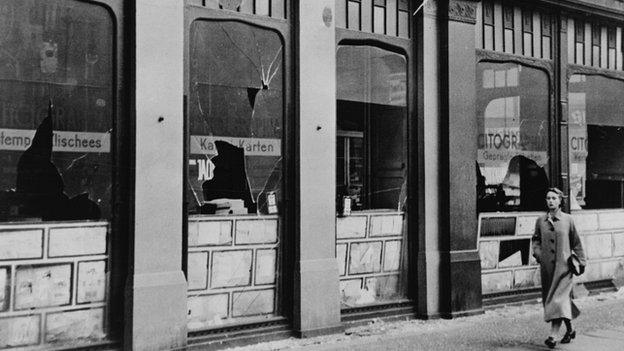
Jewish shops were attacked in a wave of attacks on Kristallnacht
"What I shall never understand, you're talking about educated people, the teachers... they didn't protest."
Mr Bibring also carries with him the permit that allowed him to enter the UK, his teenage self looking out from official stamps and small print, giving his home address in Vienna.
He travelled with hundreds of other refugees, expecting his parents to follow a few months later. He was never to see them again, his father dying of a heart attack after he was detained and his mother dying in a concentration camp.
'I didn't want to be a foreigner'
Mr Bibring arrived in London, a child staying with strangers and speaking no English. Wartime evacuation brought him to the home of a head teacher who helped him to improve his English. He carried on learning, going to night school for many years and eventually becoming a lecturer in what became Middlesex University.
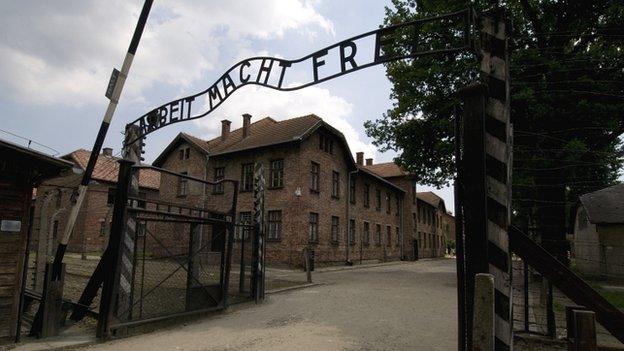
This week marks the 70th anniversary of the liberation of Auschwitz
He says he worked there for more than 20 years and never told anyone about his story.
"I never said a single thing about where I was born. I didn't want to be a foreigner."
But then an invitation came from a rabbi to talk about his life to students at a local school - and this became something that Mr Bibring did more regularly.
He became one of the survivors who visited thousands of schools, under the auspices of the Holocaust Educational Trust.
There are frequently asked questions, he says. Have you lost your religious faith? No, he says. Do you hate Germans? No, just their great-grandfathers.
He says there is one question they never ask: "What is this guy doing at his age still going round schools?"
Mr Bibring says the talks keep him going, he is keenly aware that he is part of a decreasing number able to regularly visit schools.
There is still prejudice to challenge, he says, people are discriminated against because "they live a different life, have a different skin".
'Massive loss'
But learning about the Nazis and the Holocaust will be different without such eyewitnesses.
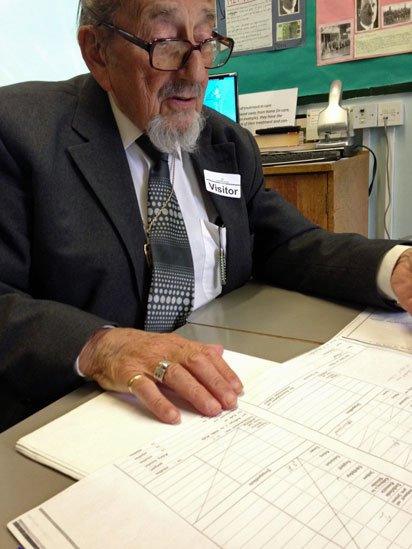
When he visited his old school in Vienna in 2005 he was given his school reports from 1938
Jessica Kempner, a history teacher at Hampstead School, says this transition is a big question for teaching about the Holocaust.
"There is something about hearing a story first-hand that gives it more meaning," she says.
"It will be a massive loss when we don't have anyone to come in."
Karen Pollock, chief executive of the Holocaust Educational Trust, says such talks make a deep and long-lasting impression on young audiences.
But they are making provisions. There are recordings of survivors on film and in writing; there is an app carrying the stories of 70 people who were involved in the Holocaust, either as victims, perpetrators or bystanders.
And there are discussions about the families of survivors giving talks.
Thousands of pupils have taken part in the Lessons from Auschwitz project in which sixth formers visit the camp in Poland.
But there is something inescapably poignant about this dignified man telling his story, looking into the eyes of someone whose eyes saw such persecution in the dark heart of the 20th Century.
"These are my memories," he says.